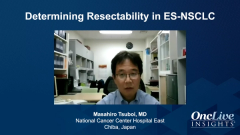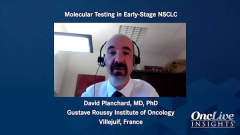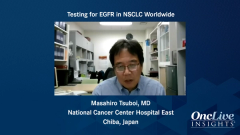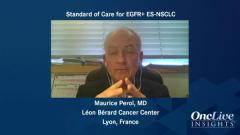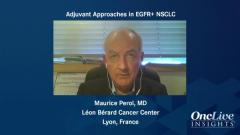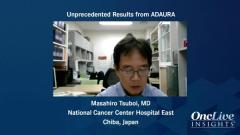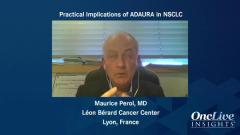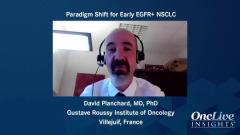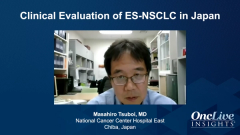
Adjuvant Approaches in EGFR+ NSCLC
Episodes in this series

Transcript:
Maurice Perol, MD: For the adjuvant chemotherapy, giving 3 to 4 cycles of a platinum-based regimen after a surgical resection of non–small cell lung cancer is often not easily tolerated in our patients. In our experience, I would say only 60% to 70% of the patients eligible for adjuvant chemotherapy receive adjuvant cisplatin-based chemotherapy. For some of these patients, we have to stop the adjuvant chemotherapy due to hematological or renal toxicity. The compliance with adjuvant chemotherapy is an issue after surgical resection of non–small cell lung cancer.
For the patients with EGFR mutations or others, it is very tempting to give targeted therapy instead of chemotherapy. We have 2 Chinese trials comparing head-to-head an EGFR TKI [tyrosine kinase inhibitor], which was gefitinib in this case, to adjuvant chemotherapy, which was based on cisplatin-vinorelbine chemotherapy. In this study, we have a majority of stage II and stage IIIA disease, so these studies were addressing patients with later stages of the disease. In both Chinese trials, the EVAN and ADJUVANT CTONG1104, the EGFR TKI achieved a clear DFS [disease-free survival] benefit over chemotherapy, but this DFS benefit did not translate into an overall survival benefit.
This lack of translation of the DFS benefit into an overall survival benefit in the ADJUVANT trial, for example, shows the follow-up is mature enough to have a clear picture of the survival of these patients. The lack of translation may have different meanings. This can first suggest that the duration of EGFR TKI adjuvant treatment was too short because a majority of recurrences were at the end of the 2-year adjuvant treatment. Another explanation may be that EGFR TKIs might only delay, rather than prevent, disease recurrence. EGFR TKIs, unlike chemotherapy, might not be able to eradicate metastatic disease; maybe the stem cells explaini that the DFS benefit did not translate into an overall survival benefit in this trial.
Due to the impact of the adjuvant chemotherapy, we do not have to drop it for eligible patients, even if there is an EGFR mutation in the resected tumor sample. We have to keep in mind that adjuvant chemotherapy is able to increase the cure rates of these patients, even if you consider giving a targeted therapy, especially osimertinib, after adjuvant treatment if the patient is fit to receive a cisplatin-based adjuvant therapy.
David Planchard, MD, PhD: The biggest trial for adjuvant chemotherapy was the IALT trial, the first one, followed by the ANITA trial, which confirmed the benefit in terms of overall survival. It’s an absolute benefit, around 5% at 5 years if patients receive platinum-based chemotherapy. For the patients with stage IB and IIIA, that means you will reduce the probability of deaths who have been operated on by about 10% to 12% if they receive a platinum-based chemotherapy in 4 cycles after surgery. The most well-known association is with vinorelbine. This should reach at least around 300 mg/kg—equivalent to platinum[-based chemotherapy]—which has been done in this trial. This is the only positive trial in overall survival in non–small cell lung cancer after surgery if they receive an adjuvant chemotherapy.
Transcript Edited for Clarity


